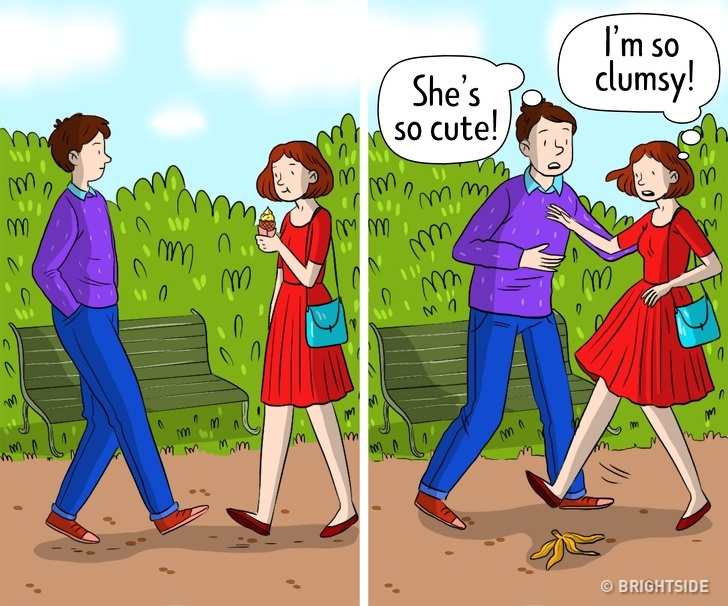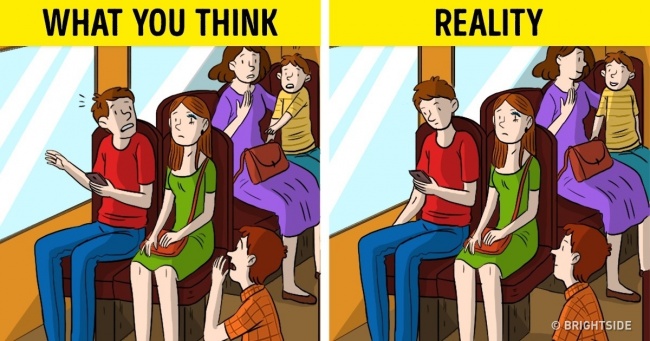The human brain can act really weird sometimes! It makes us behave irrationally, believe in total nonsense, and can even change our memories. However, every decision we make is made for a reason. So what exactly is it that determines the choices you make?
Bright Side has gathered seven psychological effects that determine your behavior along with several pieces of advice on how to deal with them.
1. Strangers can influence a person’s behavior.

It’s all about the Zajonc theory (social facilitation). You can walk around in an old torn t-shirt at home but act like a lady in public. However, a person’s behavior depends not only on his company but also on the number of unintentional witnesses he or she is surrounded by at a certain moment. For example, a man is likely to give up his seat on a public bus to impress a lady.
How to avoid getting caught up? From time to time, ask yourself, “Why am I doing this? Is it to impress someone and make them like me, or because I want it?”
2. Due to a person’s interest in an experiment, they might behave differently.

The Hawthorne effect applies here. A new environment has a way of peaking our interest in an experiment or event, making us behave differently, act more diligent and loyal, and give a false positive result. For example, in a supermarket, let’s say you’re offered to taste a fish paste with a new flavor and fill out a questionnaire. You may give it a high mark at the store but at home, you realize there’s nothing special about it.
How to avoid getting caught up? Try to think clearly and critically. Responding to a survey or experiment doesn’t oblige you to give the highest mark only because you were chosen to participate as an expert.
3. People remember unfinished tasks better than finished ones.

The Zeigarnik effect applies here. A person is more likely to remember things or actions that have yet to be completed. For example, a waiter remembers about your order until they bring it to you and after that, they shift their attention to other guests. It’s similar to making a sale to a woman who’s already chosen a wedding dress somewhere else — she’s not going to remember the dresses you showed her.
How to avoid getting caught up? It’s better to finish everything you do to avoid it getting stuck in your memories. At least finish it in your head. It’ll help you keep your feet on the ground and stop asking “What if…”
4. People buy expensive things on purpose.

It’s the Veblen effect — an economically unjustified demand for expensive products. This effect is often observed among young people who care about keeping up their social status. Discount products or goods that are on sale are thought of as defective.
How to avoid getting caught up? Consider yourself caught up in this effect if you seek out the newest Gucci bag or a trip to Europe just to make another great Instagram post. When buying another expensive thing, ask yourself, “Are you paying for high quality or social prestige?”
5. People tend to like those who make mistakes.

This is an example of the pratfall effect. People who make mistakes and look funny tend to be more appealing to us. Perfection keeps us at a distance and can even be irritating.
How to avoid getting caught up? Don’t be afraid to look clumsy or act silly — these things actually make you more attractive! Plus, it’s much easier to meet people when we’re our authentic selves rather than when we act like queens and kings.
6. People overestimate the amount of attention they get.

The spotlight effect is having the feeling that you’re being looked at and that people are noticing all of your mistakes. If a woman forgot to apply mascara on one eye, she’ll be sure that everyone around her will notice it and laugh at her. A team of psychologists from Cornell University asked a group of people to wear a t-shirt with a silly print on it and count the number of people who noticed it. They falsely counted twice as many people than the actual number of people who noticed the print.
How to avoid getting caught up? People notice our mistakes much less than we think. If you have a spot on your shirt, don’t dwell too much on it. Just think about how often you ever notice other people’s mistakes…it doesn’t happen much.
7. The more people that surround you, the less likely someone will try to help you when you need it.

The bystander effect applies here. The more people that surround a person who needs help, the less likely any one of them will actually help. If there are a lot of people in one place, each of them is likely to think that someone else will help. Therefore, no one helps.
How to avoid getting caught up? If you’re suddenly feeling sick in a public place, don’t call out to the whole crowd. Instead, ask a specific person to help you. This way you’ll have a better chance of being heard.
Have you ever witnessed any of these situations where a person let a psychological effect take control of their behavior? Share your opinion with us in the comments.












